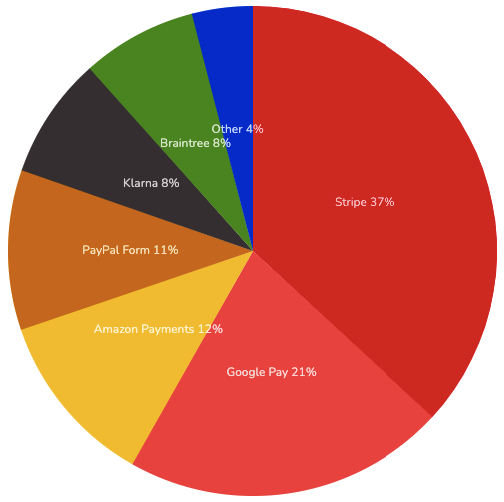Who uses this technology?

General usage
Secure, user-friendly financial transactions lie at the heart of online commerce. Without a suitable payment gateway, your ecommerce platform will not succeed.
Criteria for payment gateways include scalability, availability in local currencies, payment methods, ability to handle cross-border transactions and take care of regulatory burdens such as KYC. On top of that, they need to offer seamless payment experiences that support different revenue models, e.g. subscriptions for SaaS platforms or split payouts for online marketplaces.
Stripe became the world’s second-most valuable startup because it ticks all the above boxes and more:
Stripe supports 135+ currencies and can be used by businesses in 46 countries.
It accepts all modern payment methods including credit and debit cards, bank transfers, bank debits, bank redirects, buy-now-pay-later, vouchers, and digital wallets (e.g. Apple Pay and Google Pay).
It supports recurring payments for different billing types: subscriptions, usage based, volume tiers, promotions and trial periods. Billing frequency can be set daily, weekly, monthly or annually.
It supports pre-authorisation. Merchants can place a hold on a card to reserve funds which are only paid out after a product is delivered or a service has been rendered.
It provides high levels of security and automates regulatory compliance. Stripe is a PCI Level 1 service provider, the highest certification in the payments industry. All transactions are encrypted, screened by advanced anti-fraud technology and subject to KYC checks.
It supports split payouts. Customer charges can be split between multiple sellers, taxes and platform fees. This is especially important for multi-vendor marketplaces where shopping carts may include products from more than one seller.
Stripe offers best-in-class flexibility for all types of online businesses. Smaller companies can use their modular out-of-the-box solutions, such as prebuilt UI components, that integrate with popular platforms like Shopify or WooCommerce. Larger or more complex applications can customise payment flows in a variety of programming languages like NodeJs, PHP and React to suit their specific business cases.
Popularity
Stripe was rated the top global payments service provider in 2021 by Forrester, a leading market research company. It’s therefore no surprise that it is used by 37% of the world’s top 1 million sites:

Source: Builtwith
Marketplace benefits
Stripe’s dedicated marketplace solution, Connect, has made payment integration for marketplaces faster, more adaptable, and more scalable. It caters for any marketplace business model as evidenced by its widespread adoption by marketplace heavyweights like Amazon, Deliveroo, Lyft, Booking.com and Zillow.
CobbleWeb has used Stripe Connect to handle complex payment flows for a number of high-growth marketplaces. We’ve used it to accommodate a variable commission structure for Affordable Art Fair. Commision can be percentage-based or fixed amount and can be set globally or per seller.
We improved property management platform, Nestify’s quality control by including a hold function for cleaner payouts. Property managers are able to review and approve a cleaner’s work before payouts are triggered.
Stripe Connect allowed us to grow event ticket marketplace, FanPass’s international client base with multi-currency support for a wide range of payment methods and payout types. Their payment flow also includes a variable commission structure with different payout frequencies for different classes of sellers. High risk sellers, for example, are only paid out after the ticket has been collected.
We're here to help!
Would you like to know more about the suitability of a particular technology for your marketplace? Get in touch for a free audit and recommendations.